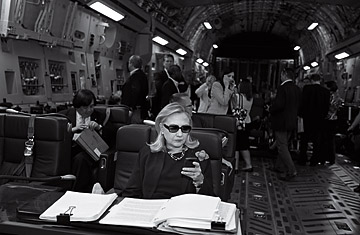
Clinton aboard a C-17, on her way to meet with rebel leaders in Tripoli.
(2 of 6)
Foreign policy traditionalists say it's naive to think that new techniques like using social media or mobilizing nongovernmental actors could ever compare to great-power relations in steering the events of our time. They point to the messes in Afghanistan and Pakistan, deteriorating Arab-Israeli relations and the failure to corral Iran and ask how Twitter will solve them. But Clinton is something of an expert in coming up with creative ways to maximize limited power. She has succeeded in her public career thanks to her unorthodox approach to the office of the First Lady and despite the constraints imposed by a White House run by her former political rival Barack Obama. As she heads into what is almost certain to be her last year at State, Clinton is pushing ahead with a combination of record-setting travel (punctuated by catnaps on the sofa bed in her plane), new partnerships with private organizations and an effort to immerse everyone from entry-level foreign-service officers to newly appointed ambassadors in social media.
Strength in Numbers
Two days after Clinton left Libya, her longtime aide Huma Abedin handed her a BlackBerry with the news that the rebels had captured Gaddafi in his hometown of Sirt. Clinton's initial reaction was a blunt update of Julius Caesar's famous expression of hard power. "We came. We saw. He died," she said to her staff.
Clinton takes a lot of pride in the fact that the U.S. did not go into Libya to conquer it. Instead, she led the behind-the-scenes effort that ended in Gaddafi's death, pushing wary neighbors to assist the rebels in their revolt. On March 12, the Arab League asked the U.N. to impose a no-fly zone, knowing that only the U.S. could lead such an operation. Clinton told the Arabs a U.S.-led no-fly zone alone wouldn't protect the civilians it was designed to help and instead worked to persuade the Qataris, Emiratis and Jordanians to join with the U.S. in striking Gaddafi's forces on the ground.
Success at that gave Clinton a shot at overcoming Russia's traditional reflexive veto of any U.N. resolution authorizing U.S.-led military intervention. Though Russia has its own restive minorities and fears broadly used American military might, Clinton told Obama she thought she could turn Russia around, with Arab countries asking for help and joining the fight. "Let's test that," Obama replied. And so, while traveling in Tunisia in March, Clinton placed a 15-minute call to Russian Foreign Minister Sergei Lavrov and persuaded him to abstain on a U.N. resolution authorizing direct strikes against Gaddafi's forces. "C'mon Sergei, this is important, and the Arab League and the Arab countries are behind us," Clinton recalls telling Lavrov during the call. Lavrov's O.K. cleared the way for Obama to launch more than 200 Tomahawk missiles against Libyan positions and provide the command and control for French, British and a handful of Arab fighters.
